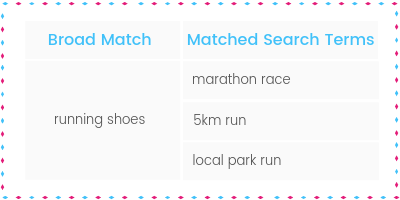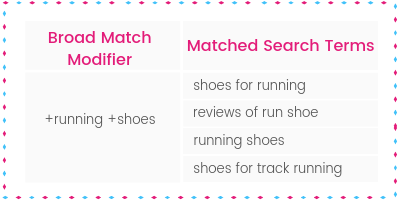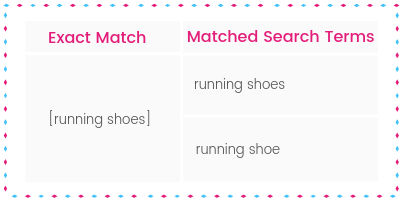Fine Tune Your Google Ads with Keyword Match Types
08 July 2019
One of the most common mistakes advertisers who are new to Google Ads make is not fully utilising the available keyword matching options. Here we will discuss the four match types and how you should use them!
Setting up your Google Ads account for the first time can be daunting and there are many factors to take into consideration, including your daily budget, your bids, what channels are most suitable for your goals and budget and so on. One of the most common mistakes advertisers who are new to Google Ads make is not fully utilising the available keyword matching options.
When bidding on a particular keyword within your Google Ads campaigns, you will need to select a keyword match type, which tells Google how strictly or loosely you want it to match your ads to user search queries. There are four different keyword match types to choose from when advertising: Here we will discuss the four match types and how you should use them.
As the default option for both Bing and Google Ads, Broad Match lets a keyword trigger your ad to show whenever someone searches for that exact phrase, similar phrases, singular or plural forms, misspellings of the phrase, synonyms, “stemming” (such as walks and walking), related searches and other variations.
A good reason for Broad Match to exist in your ad account is to trigger many different Search queries to find new keywords to add into the account, helping you to expand the reach of your campaigns. However, what you need to keep in mind is that sometimes Google’s interpretations may end up showing your ads in searches that really aren’t relevant to your brand or your product/service.The issue with Broad Match is that your ad will show for semi-relevant terms that don’t contain any of your keyword text (as shown below) and, as a result, you have very little control over what your ads are appearing for. This is why, when you have this type of keyword in your account, it is extremely important to have a rigorous Search Term reporting habit, as Broad Match will likely trigger many irrelevant keywords.

If you are currently using Broad Match keywords in your brand campaign, double check that they aren’t doing more harm than good!
Broad Match Modifier (or Modified Broad Match) lets you specify what words must be in a particular Search query in order for your ad to be served. By doing this, your keyword is still within Broad Match, but you have slightly more control.
With Broad Match Modifier, the Search terms that your ads will appear for need to have each keyword within the query, but the keywords can be in any order. For example, +running +shoes will show your ads for the Search query ‘shoes for running’. As a result, this a good option in order to target a broader audience and to expand your reach, whilst also giving you more control over the relevancy of your ads to the Search query.

Phrase Match, on the other hand, allows a keyword to trigger your ad to show only when someone searches for your exact keyword phrase, or close variations of your exact keyword phrase, with potentially other words before and after.
This keyword match type is similar to Exact Match in that it will pick up Search queries with your keyword in them, but it may have additional words before and after your keyword. It also differs from Broad Match Modifier as the Search query must appear in the same order as the phrase you are bidding on. For example, “Running Shoes” will pick up the search term “Best Running Shoes”.

Previously, Exact Match meant that Google would only serve an ad when a user’s search exactly matched the keyword. Exact Match keywords prevented you from serving an ad if a user’s search didn’t exactly match your keyword. However, Exact Match is “not so exact” anymore. This is because Exact Match now also picks up close variants of your keywords. To eliminate a lot of redundant keywords in your ad groups, Google will have your Exact Match keyword pick up misspellings, singular or plural forms, abbreviations or reorder of your words, so long as it does not change the meaning of the keyword.
As it can be quite restrictive, we would recommend using Exact Match only when you want to target specific terms and not any of their variations. For example, we have found Exact Match to be ideal for Brand campaigns, especially if the brand and its offering is quite niche. In many cases, this is because extensions of the term are not directly relevant; for example, the terms could include ‘phone number’, ‘review’, ‘coupon code’ and ‘sale’. The term could also include a location, which is irrelevant if driving in-store traffic is not one of your business objectives.

By utilising different match types in your account, you can achieve very positive results! The match type you select will always depend on your objectives, however we typically use a combination of Broad Match Modifier and Phrase Match for broader targeting, but with more control than Broad Match. For example, for the keyword ‘running shoe’, Phrase Match will pick up useful terms like “running shoes Ireland” or “local running shoe offer”, which can be cheaper and more beneficial to your business as they are longer tailed and more specific. We would also select Exact Match we need to have absolute control over the Search term, for example for Brand campaigns.
Additionally, we would also recommend tailoring your bids for each match type, rather than creating separate campaigns for each type. For example, we would typically bid higher for Exact Match as we are more in control of the Search term, bid lower for Phrase Match and lower again for Broad Match Modifier. Bidding lower on keywords that are potentially less relevant means minimising budget wastage on broader terms.
Finally, if you want to split the match types out separately, we would recommend doing so at Ad group level so that your campaigns are not competing against one another.
Want to find out how a Google Ads campaign can help boost your business? Get in touch with us today!